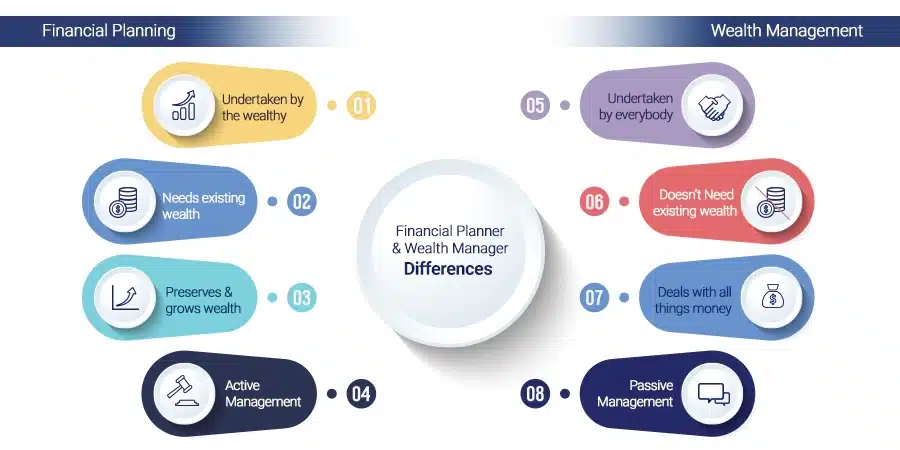In This Article
As the financial industry grows continually and achieves new heights day after day, people are becoming prudent with their financial decisions and wealth planning.
That is why, today, a majority of people look for private wealth managers or financial planners.
These professionals provide them with the results they expect from them in terms of managing their finances. However, the roles of a private wealth manager and a financial planner differ in various aspects.
Therefore, it would be wise to know the meaning of Private wealth v/s Financial Planner and then choose one. These two kinds of professionals are very different from each other. Let us learn about it in detail.
Quick Summary
In short, you will get to know the differences between private wealth managers and financial planners in managing personal finances, and different types of financial planners, including robo-advisors, in-person financial planners, and registered representatives.
It highlights the importance of seeking professional assistance when facing complex financial situations or making critical life decisions that require financial security.
You will also know about the net worth of clients financial planners and wealth managers work with, their level of involvement in portfolio diversification, the range of services they provide, the duration of their services, and the fees they charge.
Overall, you can have a clear idea of how to choose the appropriate professional based on your specific financial goals and circumstances.
Private Wealth Manager v/s Financial Planners
A private wealth manager is different from a Financial Planner, but we need to determine the difference between them.
Talking about a private wealth manager is a financial professional whose key role is to manage the finances of high-net-worth individuals.
Because these individuals have a very high income, and therefore their expenditure, things sometimes become complicated.
They get twisted in such a fashion that sailing through their financial goals becomes very difficult for a single individual to handle. Therefore, they hire such private wealth managers.
These private wealth managers provide holistic aid in managing such individuals’ finances. Now coming as a financial planner, He acts as a guide when it comes to your current and long-term financial goals.
They basically analyze and assess your financial situation and your financial goals – both current and long-term ones- and then create a good plan to achieve it all. When there is clarity on your financial goals and a plan to meet them, a lot of decluttering happens automatically.
Thus, the client ends up spending less, paying off debt, saving, and investing for a better and secure future. A financial planner is different from a private wealth manager.
A financial planner is someone who clears all your misconceptions about your finances and helps you sail through them smoothly. They provide expert financial advice that is centered around your questions about managing finances.
What is meant by Wealth Management?
So what comes to your mind when you talk about Wealth Management? What is meant by Wealth Management? Wealth management is a process that continues throughout one’s lifetime.
It is a procedure that aims to provide appropriate plans and techniques for growing, managing, and expanding wealth so that it meets the clients’ life goals.
Wealth management is not a defined or pre-set destination. It is a journey that the client undergoes with the support of a wealth manager. It is the basis for achieving all your life goals with ease and frequent decluttering.
A private wealth manager does that. Along with that, we have several wealth management firms. The wealth management process can be put into action even before someone’s birth and can go on even after someone’s death.
The service these private wealth managers offer differs from client to client based on their different goals and priorities.
Categories of a Financial Planner
A financial manager also has categories. For example, some financial managers are experts in a particular field like managing investments.
And on the other hand, certified financial planners offer diligent advice on investment, budgeting, and retirement plans. Hence you can call them general practitioners.
What do private wealth managers do?
What does primarily come to your mind when we talk about what private wealth managers do? First, a private wealth manager addresses more complicated client situations like proper investment planning, portfolio diversification, business succession, expansion of wealth, children’s education, retirement planning, multigenerational financial planning, etc.
These are very diverse aspects of wealth management and therefore are often managed by a team of wealth managers. Sometimes, this team might also include legal advisors and business consultants.
Let’s know about some steps a Wealth Manager takes
After knowing what does Private Wealth Manager v/s Financial Planner means, we need to find out what steps a Wealth Manager takes. The private wealth manager must be a very strategic and organized professional. They should take steps towards a successful wealth management process one by one. So, what are the steps a Wealth Manager takes? These steps are explained below:
- The private wealth manager will spend time with their client. They will first inquire with their clients about the income, expenses, insurance they have opted for, financial goals, risk appetite, and other such necessary information.
- They provide answers to the client’s questions about the plans and strategies for wealth management. These plans vary from time to time.
- The private wealth manager also advises their clients about cash management, investment diversification, insurance coverage, and so on. This helps the clients a lot in achieving their financial goals.
- Such managers analyze the financial information given to them by the clients. Then they find the ways and means to attain the client’s financial objectives.
- A private wealth manager aids clients in achieving those objectives and can also refer them to someone who can assist them with implementing the plan. As said earlier, there might be a team of wealth managers.
- To make the wealth management sail smoothly, the private wealth manager reviews the client’s accounts and makes the necessary changes to the plans. These changes result from life changes, economic changes, environmental factors, and changed priorities in the client’s life.
- Private wealth managers should manage the client’s portfolio and work towards its healthy diversification. And make sure that this portfolio is being updated from time to time.
- To keep wealth management running with ease and clarity, the wealth manager must regularly contact their clients.
- They should guide their clients in gathering correct information about life insurance, bank accounts, pension plans, wills, and many more.
- The wealth manager is the one who is updated with the market trends and thus, monitors the wealth management plans accordingly.
Thus, there are many obligations a private wealth manager has to fulfill to meet the needs of their clients and some basic steps he has to take. In addition, a private wealth manager works in a team, and often, many key works are happening behind the scenes.
When do you need a private wealth manager?
One might be confused if he needs a Private Wealth Manager or Financial Planner. How would you know when you need a private wealth manager? Usually, wealthy people hire a private wealth manager.
However, since such people have many financial sides to their goals and lives, managing them alone sometimes becomes impossible.
Therefore, seeking help from a private wealth manager is the most prudent choice one can make. We are always here to help you in managing your finances. Just book a call at https://app.quadrawealth.com/free-training, and our experts are there to help you.
The private wealth manager helps such ultra-wealthy clients in sorting out all their financial complications. They are well informed about the finances and how they run in such clients’ families.
This knowledge helps them to provide a very holistic aid to their clients. Thus, if you are rich and managing your finances has become so complex, hiring a private wealth manager is the best choice.
When Do You Need A Financial Planner?
So, the question arises when you need a financial planner. One who has sorted out and runs precise financial management independently doesn’t go to a financial planner. It is always the people who have complex financial situations who approach financial planners.
When your financial situation is complicated, and you are not able to come to a rational and reasonable conclusion, you must approach a financial planner.
They help you see things with utmost transparency and get you to see through an objective lens. They guide you in making decisions that will add to your investment diversification.
As a result, you become clear about your financial priorities and thereby make prudent and profiting decisions.
These might include deciding which financial asset to buy which would yield the most promising results, what type of insurance coverage to avail, and why. This way is fundamental.
The role of a financial manager becomes even more critical when you come across personal life decisions that need financial security as well.
These types of critical situations include thinking about marriage, divorce, or bequeathing of property to the children. Your financial planner makes these difficult times easier for you and your family.
Although private wealth managers also do so, they differ from financial planners in many aspects.
Types of Financial Planners
It is important to know the types of financial planners, to choose the right one for yourself. Depending on your life situations and priorities, you can benefit from different types of financial planners. Let’s have a look into these:
1. Robo-Advisors
If you are at a stage where your financial conditions are less tricky but still need help, Robo-advisors are the best option for you.
They help you achieve better portfolio management. Robo-advisors help you build and achieve low-cost investments. Since these low-cost investments do not have high risks associated with them, in-person advice is not so necessary.
Therefore, you should go for a Robo-advisor. And they charge only 0.25% or even lower of the total investment. The investment mix is managed by a computer algorithm and is adjusted from time to time according to the client’s needs.
Getting help from a Robo-advisor is a big pro. It has very few barriers to your financial decisions. No one can interfere much with your economic life. But when the situation is complex, one should always go for an in-person financial planner.
pros
- Cost-effective
- Investing information can be accessed anywhere with an internet connection.
- Users can easily manage their investments and finances with minimal effort.
- An algorithm-driven recommendation tailored to an individual’s risk profile and financial goals.
cons
- Lack of human interaction
- Limited customization
- Limited expertise and experience as a seasoned financial professional.
2. In-Person Financial Planner
People who have complex ongoing situations in their financial lives should always consult a traditional or in-person financial planner. The in-person financial planner provides a better solution to your problems.
They discuss all the current complicated conditions with the client and provide the best solution with suitable tools and strategies. The official traditional financial planner has enough training, knowledge, and experience in the financial world.
Thus, the client is sure of the best results. However, they charge a higher fee than the Robo-advisors.
pros
- Personalized guidance
- Expertise and experience
- Holistic approach
cons
- Limited availability.
3. Registered Representative
Registered representatives, we also call them stockbrokers. A Registered Representative is a salesperson working for a broker-dealer.
Registered representatives have demonstrated basic knowledge of investment products by passing the Series 6 and/or Series 7 exams.
In addition, a certified registered representative is required to register with FINRA (the Financial Industry Regulatory Authority) and is licensed by the state’s securities regulator.
However, stockbrokers are not generally the best financial planners because their job is to sell you products, not to advise you.
In addition, most commission is paid to registered representatives on the basis of their sales. That means they have an inherent conflict of interest between recommending the best product for your needs and recommending the product that would make them the highest commissions.
pros
- Market Expertise
- Trading Execution
- Have access to Investment Options
- Provide research reports, analysis, and market insights to help clients make investment decisions.
cons
- Sales Pressure
- Limited Scope
- Some registered representatives earn commissions or receive incentives for promoting specific investment products, which could create conflicts of interest
- Certain investment products or services recommended by registered representatives may come with higher fees or charges
Well, it’s important to note that these pros and cons can vary depending on your circumstances, preferences, and the specific financial planner or platform being considered.
Finally, these were a few types of financial planners that you could choose according to your needs. Despite the many benefits of a private wealth manager and a financial planner, there are a lot of significant and sharp differences between them.
So, what are the differences?
Differences Between A Private Wealth Manager And A Financial Planner
Though both the private wealth manager and the financial planner provide financial aid to their respective clients, their roles differ in many ways. Let’s find out the differences.
1. Net Worth Of Clients They Work For
Private wealth managers, as mentioned earlier as well, work for high-net-worth individuals. Ideally, the amount of money such individuals may want to invest should range from $10 million to any amount higher than that.
However, the financial planner deals with clients whose asset investment may range from $100,000 to $5 million.
2. Level of involvement in client’s portfolio diversification
Since the private wealth manager provides a holistic solution to the client’s problems, they are involved in all the financial matters of the client’s life.
For example, when it comes to portfolio diversification, they actively indulge in gathering all the necessary information, choosing what type of financial assets to invest in, their management, updating, and finding ways to reduce the risk.
In other words, the involvement of a private wealth manager is there in the client’s life. They help their clients directly in achieving their financial goals wisely.
Whenever any issue arises, they put all their knowledge and experience into resolving that issue. This ensures a chaos-free and profiting wealth management of the client.
On the other hand, a financial planner does not involve much in a client’s financial life. They are there to give the right advice to their clients in times of need. They help the clients in making rational decisions and provide help in asset management as well.
But it is the client who ultimately has to bring the right advice and sound decisions into action. Therefore, the client cannot depend entirely on their financial planner to manage their financial life.
3. Range of services they provide
A private wealth manager and a financial planner also differ in terms of the services they provide to their respective clients.
The private wealth manager provides a broader range of services to their clients.
These services include investment management, portfolio diversification, children’s education plans, retirement plans, property inheritance, and many more.
The private wealth manager dives deeper into these aspects of the client’s life and financial conditions and goals. It is after this that they start acting on the wealth management plans actively.
However, a financial planner is different from a private wealth manager. They do not dive deeper into these subjects. Instead, they focus on the current financial goals of the client and accordingly make the decisions or advise them on the same.
However, they don’t provide a holistic approach to dealing with the client’s financial conditions. As a result, they are not aware of all the aspects of the client’s economic life and goals.
4. Duration of their services
The private wealth manager often deals with the client’s financial objectives throughout their lifetime, or we can say, for a very long period. Since their clients are ultra-wealthy individuals, their finances are not just about a few days or a few months.
Instead, their finances continue building up, going down, going up, and expanding throughout the client’s life. Thus, needing a private wealth manager throughout the process.
On the other hand, the financial planner differs from a private wealth manager in this respect too. A successful financial planner provides its services for a comparatively shorter period.
In most cases, clients hire a financial planner only when their current financial situation has gone out of control. And when there is some solution for the issue, the financial planner is done with his work.
5. Charges they take for offering their services.
There are differences between a private wealth manager and a financial planner in terms of their fees. However one cannot make this fee comparison of both the private wealth manager and the financial planner accurately.
This is because their costs vary depending on the level and duration of services they provide. It also depends on the experience of such professionals and which economy they reside in. But it can be known to a certain extent how they charge the fees.
Private wealth managers will generally charge their fees based on assets under management (AUM). AUM is the money and investments the client keeps under the services of the private wealth manager. The wealth manager may charge some percentage of this AUM as their fee.
For example, if the AUM is $10 million and the private wealth manager is charging 0.5% of it, it means they are charging $50,000 annually from their client. You can also pay this annual amount in installments as per the decision of the private wealth manager.
On the other hand, the financial planner is flexible in the way they charge their fees. They either charge on an AUM basis or a one-time, flat fee.
For instance, this one-time, flat fee may be $2000 for a particular investment plan. The financial planner can also charge on an hourly basis, like $250-$500 per hour for the service they offer.
Lastly, clients should always weigh whether they are getting the optimum results for their paying price. The services they get must be in alignment with the price they are paying to their respective professionals.
What is a financial asset every wealth manager recommends to their clients?
When high-net-worth individuals go to a private wealth manager, it is predictable that they will suggest investing in structured notes. These structured products are very promising financial assets.
Moreover, they have their benefits that make the much-awaited returns from investing in it a reality. Backed by protection against market fluctuations, structured products add a very high scope to the process of wealth management.
In countries like England and Dubai, wealth management of high-net-worth individuals is incomplete without investing in structured notes.
Thus, when you go to a private wealth manager, you should be assured that some of your investment money will be invested in these structured products.
And if you also want to invest your money in some of these structured products and need a bit of advice related to that, we are here to help you.
So book a call right now at Quadra Wealth Management and get free training and advice from our experts. Because of such promising benefits, we as a wealth management company always recommend investing in structured products.
Conclusion
Hence, very wealthy people should hire a private wealth manager to get the maximum profits. And on the other hand, when someone is looking for short-term financial benefits, they should go to a financial planner.
Both professionals have their roles and services to offer. People should be aware enough to know how and when to avail their beneficial services.
Frequently Asked Questions
What is the role of a private wealth manager?
A private wealth manager is a financial professional who assists high-net-worth individuals in managing their finances. They provide holistic aid in managing various aspects of their client’s finances, including investment planning, portfolio diversification, retirement planning, and multigenerational financial planning.
What does a financial planner do?
A financial planner acts as a guide in helping clients achieve their current and long-term financial goals. They analyze and assess clients’ financial situations and create customized plans to achieve those goals. Financial planners provide expert money advice centered around managing finances and help clients make prudent decisions related to investments, budgeting, and retirement planning.
Wealth management is a lifelong process aimed at growing, managing, and expanding wealth to meet clients’ life goals. It involves providing appropriate plans and techniques to achieve financial objectives. Private wealth managers play a crucial role in wealth management by offering personalized assistance and support to clients based on their goals and priorities.
When do I need a private wealth manager?
Typically, individuals with a high net worth hire private wealth managers. If you have complex financial situations, such as significant assets, intricate investment portfolios, or diverse financial goals, a private wealth manager can help you navigate through these complexities and provide comprehensive financial management.
When should I consult a financial planner?
Financial planners are sought after when individuals have complicated financial situations and require professional advice. If you need guidance on investment decisions, asset management, or financial security in critical life events such as marriage, divorce, or estate planning, a financial planner can provide valuable insights and help you make informed decisions.
What is the difference between a private wealth manager and a financial planner?
The main differences between private wealth managers and financial planners include the net worth of clients they work with, their level of involvement in portfolio diversification, the range of services provided, the duration of their services, and the fees they charge. Private wealth managers typically work with high-net-worth individuals, offer comprehensive financial services, and have a long-term involvement in their client’s financial objectives. Financial planners, on the other hand, cater to clients with diverse financial situations, provide more focused advice, and may offer services for a shorter duration.
How are private wealth managers and financial planners compensated?
Private wealth managers often charge fees based on the assets under management (AUM), taking a percentage of the client’s total investments. Financial planners may charge fees based on AUM, a one-time flat fee for specific services, or an hourly rate for their consultation and advice.
How do I choose between a private wealth manager and a financial planner?
Choosing between a private wealth manager and a financial planner depends on your specific financial situation, goals, and preferences. Consider factors such as the complexity of your finances, the level of involvement and expertise required, and the range of services you need. It’s advisable to interview multiple professionals, review their qualifications and experience, and assess whether their approach aligns with your needs before making a decision.
Can I benefit from both a private wealth manager and a financial planner?
Yes, some individuals may find value in engaging both a private wealth manager and a financial planner. While a private wealth manager can provide comprehensive wealth management services, a financial planner can offer specific expertise in areas such as investment analysis, retirement planning, or estate planning. Collaborating with both professionals can ensure a well-rounded approach to your financial management.













